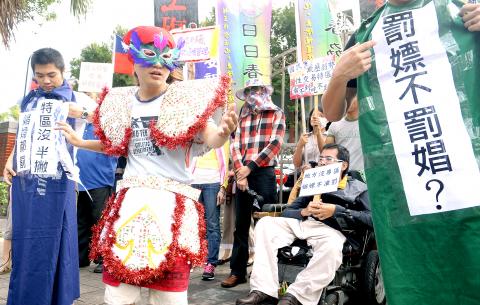The Collective of Sex Workers and Supporters (COSWAS) yesterday lashed out at both the Chinese Nationalist Party (KMT) and the Democratic Progressive Party (DPP), accusing them of reluctance to propose a real solution for sex workers as a clause in the Social Order Maintenance Act (社會秩序維護法) that penalizes sex workers is due to expire.
Declared unconstitutional by the Council of Grand Justices three years ago, a clause in the Social Order Maintenance Act that penalizes sex workers, but not their clients, will expire on Sunday.
The Cabinet has proposed amendments to the law to authorize local governments to create red-light districts where the sex trade is allowed, while it would remain banned outside those areas.

Photo: George Tsorng, Taipei Times
DPP Legislator Huang Sue-ying (黃淑英) also proposed amendments to penalize only the client, not the sex worker.
KMT Legislator Cheng Li-wun (鄭麗文) has also proposed her own law revision to totally decriminalize the sex trade. However, her proposal has not received much support from colleagues.
“The KMT said that it supports allowing the sex trade to a certain extent with appropriate management, and that’s why the Cabinet has proposed the ‘red-light district’ plan,” COSWAS executive director Chung Chun-chu (鍾君竺) told a press conference held in front of the Legislative Yuan.
“But there’s neither ‘allowing the trade to a certain extent’ nor ‘appropriate management’ in the Cabinet plan — which is supported by most KMT lawmakers — because no local government is willing to -designate red-light districts, and thus it’s a de facto complete ban on the sex trade,” Chung said.
Responding to Minister of the Interior Jiang Yi-huah’s (江宜樺) earlier remarks that the designation of red-light districts “could be discussed later after the law revision is passed,” Chung said: “Well, ‘discussing it later’ doesn’t mean anything for sex workers, because waiting for one more day means that they are not able to work and make a living for an extra day.”
Although DPP Chairperson Tsai Ing-wen (蔡英文) and the DPP caucus have criticized the Cabinet proposal, saying it would not work regardless of whether the law penalizes the prostitute or the client, or allows red-light districts, Chung said that the DPP has also failed to propose any concrete solutions.
“Both parties try to pretend that they’re open-minded and progressive, but what they do is different from what they say,” Chung said.
Although it supported complete decriminalization of the sex industry, Chung said that the COSWAS would be willing to compromise on the red-light district proposal “if a clause is added to the red-light -district deal that local governments should designate red-light districts within six months after the amendment is passed or the sex trade should remain completely legal within cities or counties where the local government fails to do so.”

An essay competition jointly organized by a local writing society and a publisher affiliated with the Chinese Communist Party (CCP) might have contravened the Act Governing Relations Between the People of the Taiwan Area and the Mainland Area (臺灣地區與大陸地區人民關係條例), the Mainland Affairs Council (MAC) said on Thursday. “In this case, the partner organization is clearly an agency under the CCP’s Fujian Provincial Committee,” MAC Deputy Minister and spokesperson Liang Wen-chieh (梁文傑) said at a news briefing in Taipei. “It also involves bringing Taiwanese students to China with all-expenses-paid arrangements to attend award ceremonies and camps,” Liang said. Those two “characteristics” are typically sufficient

A magnitude 5.9 earthquake that struck about 33km off the coast of Hualien City was the "main shock" in a series of quakes in the area, with aftershocks expected over the next three days, the Central Weather Administration (CWA) said yesterday. Prior to the magnitude 5.9 quake shaking most of Taiwan at 6:53pm yesterday, six other earthquakes stronger than a magnitude of 4, starting with a magnitude 5.5 quake at 6:09pm, occurred in the area. CWA Seismological Center Director Wu Chien-fu (吳健富) confirmed that the quakes were all part of the same series and that the magnitude 5.5 temblor was

The brilliant blue waters, thick foliage and bucolic atmosphere on this seemingly idyllic archipelago deep in the Pacific Ocean belie the key role it now plays in a titanic geopolitical struggle. Palau is again on the front line as China, and the US and its allies prepare their forces in an intensifying contest for control over the Asia-Pacific region. The democratic nation of just 17,000 people hosts US-controlled airstrips and soon-to-be-completed radar installations that the US military describes as “critical” to monitoring vast swathes of water and airspace. It is also a key piece of the second island chain, a string of

The Central Weather Administration has issued a heat alert for southeastern Taiwan, warning of temperatures as high as 36°C today, while alerting some coastal areas of strong winds later in the day. Kaohsiung’s Neimen District (內門) and Pingtung County’s Neipu Township (內埔) are under an orange heat alert, which warns of temperatures as high as 36°C for three consecutive days, the CWA said, citing southwest winds. The heat would also extend to Tainan’s Nansi (楠西) and Yujing (玉井) districts, as well as Pingtung’s Gaoshu (高樹), Yanpu (鹽埔) and Majia (瑪家) townships, it said, forecasting highs of up to 36°C in those areas